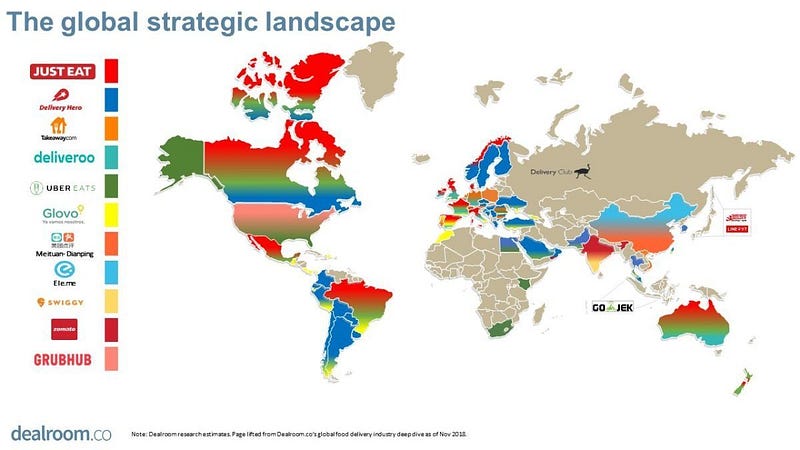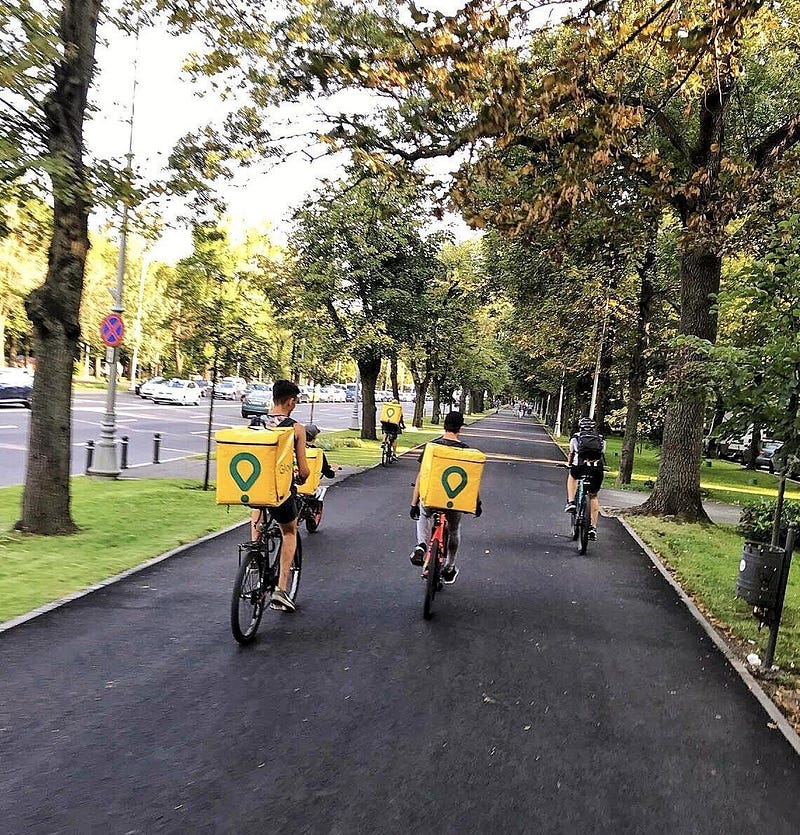Spanish Delivery Startup Glovo Enters Uganda, Its Fourth Market In Africa
Glovo appears to have found a comfortable home in Africa. Barely two years after launching in Kenya, the startup has further expanded to Kenya’s neighbour to the west, Uganda, making it the second market in East Africa for the company, and the fourth African country where it has established operations, after Morocco and Cote d’Ivoire.

“We are extremely excited about our launch in Uganda and we think that residents of Kampala should be feeling the same way! Hundreds of thousands of people in cities across Africa are already used to integrating Glovo into their daily lives to help them to save time and money and we are optimistic that our solution will be a welcome addition to customers, restaurants, and stores in Uganda,” William Benthall, Glovo’s General Manager for Sub-Saharan Africa said.
Why Expand To Uganda, And Not Other Neighbouring Countries?
“Uganda is a uniquely interesting market for Glovo. Residents of Kampala are used to using Boda Boda’s to move around and order food and other products. In addition to this informal market, there is also a large segment of the population using apps to move around or order goods for delivery. This provides an interesting opportunity to introduce a fresh new service with low prices and amazing user experience,” said Benthall.
According to StartupBlink, Kampala is the 8th best-ranked startup ecosystem on the African continent.
Here Are Quick Facts About Glovo:
- Barcelona-based Glovo is the on-demand delivery app that allows customers to order anything — restaurant meals, groceries, flowers — from more than 1,000 participating businesses and have it delivered in less than one hour.
- Simply put, the startup is known as the “anything” delivery app.
- Glovo makes profit by charging a service fee, plus a commission on their partners, depending on the cost of the product or item.
- The most interesting fact about Glovo may be that despite being founded only about 5 years ago in 2015, the company already has a presence in more than 170 cities across more than 20 countries.
- The startup’s vision is to be a lifestyle app with all urban services available easily through its smartphone application.
- Food delivery service remains its most popular service. Other services available on the app include Groceries, Pharmacy, Desserts, Courier, and Quiero (anything).
- While most companies are very focused on food only, Glovo can, however, deliver everything.
- The food business allows users to find and place orders with their favorite restaurants which is picked up when ready and delivered to the user’s doorstep. Today, more than 85% of Glovo’s orders in Europe are for food.
- Unlike the other couriers — namely the UK-based Deliveroo and US-based UberEats — Glovo couriers don’t just pick up food for customers of the app. They’ll also buy them a particular dress in a size 12 from Zara, or grab some painkillers from a pharmacy if the customers so request.
- While this model continues to be its flagship service, the company is reportedly experimenting with CloudKitchens and Grocery Darkstores.
- In fact, the startup has become so successful that the company now claims a valuation of more than $1 billion, a rare milestone for a privately held Spanish startup.
- The firm’s revenue jumped from €18 million ($20 million) in 2017 to €81 million ($91 million) in 2018.

Glovo Uganda Glovo Uganda Glovo Uganda Glovo Uganda Glovo Uganda Glovo Uganda Glovo Uganda
Why Glovo Is Succeeding In The Face Of Stiff Competition
‘‘We…Found Our Gap’’
Glovo is not the first delivery app out there. Oscar knew this. In fact, at the time of starting up Glovo, there was already the US firm Postmates (which inspired him) that delivers anything a city-dweller might need or want, as well as Uber and Amazon’s Deliveroo that do similar things. This means the startup is already in direct competition with those companies. Thus, it is rather surprising that Glovo would make such quick success.
‘‘It makes the market more difficult,’’ Oscar told Spanish online magazine Viaempressa. ‘‘We have found our gap; we are the only platform in Europe that supplies the user with anything in the city, and I think that this is the key; the offer is broad. It doesn’t scare us that the competitors are large, being small is a competitive advantage because it means we can react quickly to these monsters. They are very powerful, but they move slowly. A clear example is our partnership with McDonald’s, for which we competed against Uber Eats and Deliveroo. We got it because we were the quickest to come up with a model that McDonald’s needed, it is specific for them on a technological and logistical level. When you are a startup, you bargain more easily.’’

Pierre also said there are many differences between Glovo and other national or international startups.
‘‘Our freelancers will buy for you whatever you want,’’ he said . ‘‘Another major difference is that our service is based on immediacy. We have a totally different model compared to other apps dedicated exclusively to transport people or deliver food. In addition, we are not a logistics company, nor do we want to be. These companies are only dedicated to collect and deliver while we put a whole city open to anyone.’’
Getting The Timing Right is Crucial
Getting into a crowded market could be easy but staying successful would remain the toughest game startups will face. Oscar Pierre, however, said getting the timing right is more crucial. Glovo doesn’t come on board a country where there are already two dominant players (which is the case in Mexico, Colombia, and the UK), he said.
‘If we went to the UK today it would be super tough or impossible to become one of the main food delivery companies. It’s a snowball effect; as you don’t have the volume, you don’t reach to the top chains or restaurants which doesn’t give you the growth,’ Oscar told Sifted, a new FT-backed website that launched early 2019.
Again, the startup succeeded in Spain mostly because it brought big brands such as McDonald’s and KFC onto its app and this led to ‘massive growth’. Before then, competitors like Deliveroo refused to meet the big companies’ demands. This was an opportunity Glovo held onto. ‘‘We literally built anything they wanted,’ Pierre said.
Today, Glovo is the biggest food delivery service in Spain (where it is profitable and takes around one million orders per month)
Oscar said: ‘Every single city needs between six to nine months to reach operational break-even. Structure-wise, it’s been super interesting You have to delocalize — otherwise the company stops. You need to find super strong regional teams. In Buenos Aires, Argentina, we have a very senior team, with almost a CEO and CMO, and they take all of the decisions.’’
‘‘We pitched to 118 funds, and all of them said ‘no.’ ’’
Oscar said building the startup did not come without a fight. He said the startup pitched to 118 funds before its current progress.
“For our series B round, we pitched to 118 funds, and all of them said ‘no.’ We were very close to going bankrupt, maybe a month away. All our competitors were huge. Two years ago, there was no way to convince investors that we’d really be competing face-to-face with Uber Eats or Deliveroo. There was very little conviction about food delivery back then.
Being from Barcelona was always very tough because when you only operate in Spain, you don’t have access to the VCs in London or in France. The Spanish ecosystem of VCs is very small and very risk-averse,” he said.
In 2017, Glovo raised $30 million in a series B funding round led by the Japanese tech giant Rakuten. Rakuten ended up being a company with a famous connection to Barcelona that came to Glovo’s aid.
‘‘One day, Rakuten came out of the blue and decided to invest in us,” Pierre said.
Since then, two other funding rounds have followed, the latest of which, totaling 150 million euros, or $170 million, was led by the early Spotify investor, Lakestar, in April, 2019 taking the startup’s total funding to $340 million. In December, 2019, it, again, raised €150 million ($167 million) in a series E round of funding led by UAE-based investment firm Mubadala, with participation from Lakestar, Drake Enterprises, and Idinvest.

Remembering those periods in the startup’s story, Pierre said he didn’t know if he were doing a rational thing then.
‘I have to say, I don’t know if it was a very rational investment at that moment — when you have over 100 smart investors saying no, it might mean something,’ he said.
See Also: How Kristo Käärmann’s Frustration Led Him To Build Europe’s Most Valuable Startup
‘‘Become obsessed about being profitable’’
Oscar said the most important factor that has guaranteed the startup’s continuous growth is its quest to remain profitable.
‘‘Only those who focus on profitability get funding,” he said. “We make sure we are not only growing, but that the cities are not in negative numbers for many months. We know there are cities that need only six months to show losses and others, 12 months, because it all depends on size; but we know that sooner or later we will get good numbers. In Spain we have seen more than 10 proposals similar to ours and many of them have failed. The margins are small and if you do not look after them well, it will not work,’’ he said.
Focusing on profitability has helped the startup to steer clear of loss. In 2016 Pierre said the startup obtained 1.1 million net euros in profit, which represents the commissions from their partners and shops along with what the user paid for the service, and that meant tenfold growth. In 2017, barely two years and two months old, the startup took a millionth order. The number has since doubled.
‘When a sector is overfunded…investors disappear’
Pierre said the urge for startups to get funded almost always comes with a price — a sudden disappearance of investors.
‘‘Delivery is a complicated sector. Between 2010 and 2012, there was overfunding in Barcelona. It was new and grew quickly because it clearly had value. A lot of projects were funded that began to close down in 2014 and that went on for another couple of years. That was just the moment when we began looking for funding. The investors saw that the sector was in fashion, but that it had problems. And what happens when a sector is over-funded is that the investors disappear,’’ he said.
The Best Way To Confront Fund-Raising
Pierre said the best way to confront fund-raising is by being humble.
‘Our most important core value is humbleness. I tell it to the team a lot. I’ve seen companies burst because of lack of humbleness,’ he said.
‘Every time I go to the board, I’m like, “Oscar man, if you’re not taking big steps you’re not going to be the best CEO for this company.” So I just keep that in my mind all the time.’
Charles Rapulu Udoh

Charles Rapulu Udoh is a Lagos-based lawyer who has advised startups across Africa on issues such as startup funding (Venture Capital, Debt financing, private equity, angel investing etc), taxation, strategies, etc. He also has special focus on the protection of business or brands’ intellectual property rights ( such as trademark, patent or design) across Africa and other foreign jurisdictions.
He is well versed on issues of ESG (sustainability), media and entertainment law, corporate finance and governance.
He is also an award-winning writer

